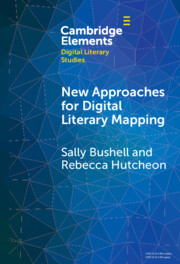Refine search
Actions for selected content:
15 results
8 - Joyce the European
-
-
- Book:
- The Cambridge Companion to James Joyce
- Published online:
- 14 August 2025
- Print publication:
- 21 August 2025, pp 136-152
-
- Chapter
- Export citation

New Approaches for Digital Literary Mapping
- Chronotopic Cartography
-
- Published online:
- 07 February 2025
- Print publication:
- 13 February 2025
-
- Element
-
- You have access
- Open access
- HTML
- Export citation
Chapter 3 - Aesthetic Designs in the Language of Love
-
- Book:
- Guru Nanak's Transcendent Aesthetics
- Published online:
- 21 November 2024
- Print publication:
- 21 November 2024, pp 110-160
-
- Chapter
- Export citation
Chapter 6 - The Kalends of January
-
- Book:
- Popular Culture and the End of Antiquity in Southern Gaul, c. 400–550
- Published online:
- 15 March 2024
- Print publication:
- 28 March 2024, pp 173-218
-
- Chapter
-
- You have access
- Open access
- HTML
- Export citation
Chapter 16 - Joyce and Critical Theory
- from Part III - Perspective
-
-
- Book:
- The New Joyce Studies
- Published online:
- 01 September 2022
- Print publication:
- 08 September 2022, pp 252-267
-
- Chapter
- Export citation
9 - Engaging with Symbolic Power—Responding to Symbolic Violence
- from Part III - The Power to Create Symbolic Reality
-
- Book:
- Language as Symbolic Power
- Published online:
- 15 October 2020
- Print publication:
- 29 October 2020, pp 174-194
-
- Chapter
- Export citation
2 - Situating Discourse Analysis in Ethnographic and Sociopolitical Context
- from Part I - (Con)Textualizing Discourses
-
-
- Book:
- The Cambridge Handbook of Discourse Studies
- Published online:
- 28 September 2020
- Print publication:
- 15 October 2020, pp 32-51
-
- Chapter
- Export citation
Chapter 1 - Premises and Expectations of the Elegiac Grotesque
-
- Book:
- The Grotesque in Roman Love Elegy
- Published online:
- 10 September 2020
- Print publication:
- 17 September 2020, pp 1-30
-
- Chapter
- Export citation
6 - Trump’s Comedic Gestures as Political Weapon
- from Part II - Performance and Falsehood
-
-
- Book:
- Language in the Trump Era
- Published online:
- 18 September 2020
- Print publication:
- 03 September 2020, pp 97-123
-
- Chapter
- Export citation
Chapter 3 - South African English, the Dynamic Model and the Challenge of Afrikaans Influence
- from I - A Framework for English in South Africa
-
-
- Book:
- English in Multilingual South Africa
- Published online:
- 07 November 2019
- Print publication:
- 21 November 2019, pp 30-51
-
- Chapter
- Export citation
I - A Framework for English in South Africa
-
- Book:
- English in Multilingual South Africa
- Published online:
- 07 November 2019
- Print publication:
- 21 November 2019, pp 1-126
-
- Chapter
- Export citation
Evolving Identities Among Russian-Born Buriat Mongolian Children in a Chinese Bilingual School
-
- Journal:
- The Australian Journal of Indigenous Education / Volume 45 / Issue 1 / August 2016
- Published online by Cambridge University Press:
- 22 March 2016, pp. 36-47
- Print publication:
- August 2016
-
- Article
- Export citation
Promoting exchange between East and West management cultures: The role of dialogue
-
- Journal:
- Journal of Management & Organization / Volume 15 / Issue 4 / September 2009
- Published online by Cambridge University Press:
- 02 February 2015, pp. 514-525
-
- Article
- Export citation
Identity constructions in multilingual advertising
-
- Journal:
- Language in Society / Volume 30 / Issue 2 / April 2001
- Published online by Cambridge University Press:
- 09 January 2002, pp. 153-186
- Print publication:
- April 2001
-
- Article
- Export citation
